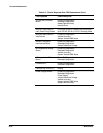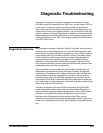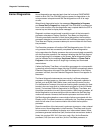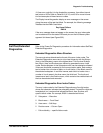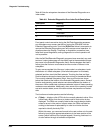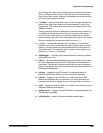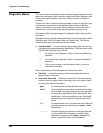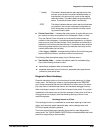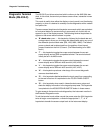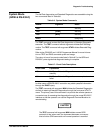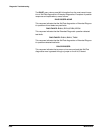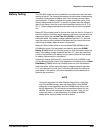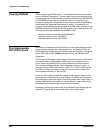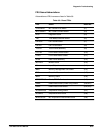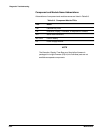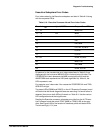
Diagnostic Troubleshooting
Maintenance
6Ć86
The RSĆ232ĆC port drives a terminal which conforms to the ANSI 3.64 stanĆ
dard. In this mode, the terminal provides a screenĆdriven, interactive human
interface.
This mode is useful when either the display or touch panel is not functioning
properly, or when it is desired to remotely use the diagnostics with a modem
and phone link.
There are several single terminal keystroke commands which are equivalent
to front panel buttons or are terminalĆonly commands, all of which do not
appear on any of the display screens. The following terminal keystrokes do
appear on the screen and are shown in quotes:
H `B'<baud rate><cr> Ċ this keystroke, followed by the baud rate and
carriage return) allows you to change the default baud rate to any one of
the allowable product baud rates (300, 1200, 9600, 19200). The default
powerĆup baud rate is determined from the position of two internal
jumpers located on the A14 I/O board. (The Default setting is for 9600
baud.)
H `T' Ċ this keystroke toggles the screen output between the current
screen display and an ANSI compatible terminal. The terminal should
initially be set in its ANSI mode.
H `K' Ċ this keystroke toggles the screen output between the current
screen display and a Tektronix 4x05 terminal (4105, 4205).
H `L' Ċ this keystroke toggles the screen output between the current
screen display and a Tektronix 4x07 terminal (4107, 4207).
H `H' Ċ this keystroke produces a hardcopy of the current diagnostic
menu as described earlier.
H `O' Ċ this keystroke disables/enables the touch panel from responding
to the user's touches. It is equivalent to the TOUCH PANEL ON/OFF
button.
H `Q' Ċ this keystroke, when used in interactive test menus, stops and
starts the display information in the keypad prompt area. This keystroke
is equivalent to the ACQUISITION RUN/STOP button in those menus.
To gain access to the terminal mode diagnostics, the instrument must be in
the Extended Diagnostic mode.
To exit the terminal mode, either recycle the power, enter the (Exit) keystroke
twice to begin normal operation, or enter the appropriate `L', `T', or `K'
keystroke to transfer the screen output back to the instrument display.
Diagnostic Terminal
Mode (RSĆ232ĆC)



